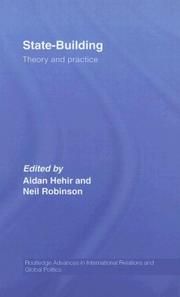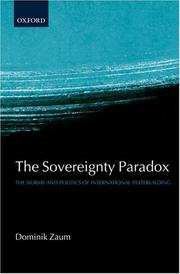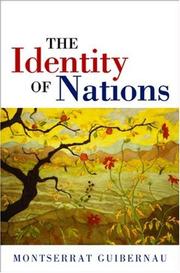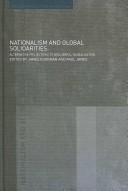| Listing 1 - 10 of 123 | << page >> |
Sort by
|

ISBN: 9780415394352 9780203964712 9781134160150 9781134160198 9781134160204 9780415543484 Year: 2007 Publisher: Milton Park, Abingdon, Oxon ;New York Routledge
Abstract | Keywords | Export | Availability | Bookmark
 Loading...
Loading...Choose an application
- Reference Manager
- EndNote
- RefWorks (Direct export to RefWorks)
Book
ISBN: 9783000210037 3000210032 Year: 2007 Publisher: Freiburg, Br. : Frankreich-Zentrum,
Abstract | Keywords | Export | Availability | Bookmark
 Loading...
Loading...Choose an application
- Reference Manager
- EndNote
- RefWorks (Direct export to RefWorks)
Literatur. --- Nation. --- Nationalbewusstsein. --- Literatur --- Nation
Book
Year: 2007 Publisher: Washington, DC : U.S. Institute of Peace,
Abstract | Keywords | Export | Availability | Bookmark
 Loading...
Loading...Choose an application
- Reference Manager
- EndNote
- RefWorks (Direct export to RefWorks)
Book
ISBN: 9782915378429 2915378428 Year: 2007 Publisher: Marseille: Le mot et le reste,
Abstract | Keywords | Export | Availability | Bookmark
 Loading...
Loading...Choose an application
- Reference Manager
- EndNote
- RefWorks (Direct export to RefWorks)
Book
ISBN: 9782763784250 2763784259 Year: 2007 Publisher: Québec : Presses de l'Université Laval,
Abstract | Keywords | Export | Availability | Bookmark
 Loading...
Loading...Choose an application
- Reference Manager
- EndNote
- RefWorks (Direct export to RefWorks)
Nation-state. --- Minorities. --- Ethnicity. --- Nation --- Minorités --- Ethnicité
Book
ISBN: 9781601270177 Year: 2007 Publisher: Washington : United States Institute of Peace Press,
Abstract | Keywords | Export | Availability | Bookmark
 Loading...
Loading...Choose an application
- Reference Manager
- EndNote
- RefWorks (Direct export to RefWorks)

ISBN: 9780199207435 0199207437 Year: 2007 Publisher: Oxford: Oxford university press,
Abstract | Keywords | Export | Availability | Bookmark
 Loading...
Loading...Choose an application
- Reference Manager
- EndNote
- RefWorks (Direct export to RefWorks)
Sovereignty. --- Nation-building. --- International relations --- Souveraineté --- Reconstruction d'une nation --- Relations internationales --- Nation-building --- Sovereignty --- Souveraineté

ISBN: 9780745626635 9780745626628 0745626629 0745626637 Year: 2007 Publisher: Cambridge : Polity Press,
Abstract | Keywords | Export | Availability | Bookmark
 Loading...
Loading...Choose an application
- Reference Manager
- EndNote
- RefWorks (Direct export to RefWorks)
Migration. Refugees --- Philosophical anthropology --- National movements --- Nationalism. --- Nation-state. --- Nationalisme --- Nation --- 242 Nationaliteitenproblemen, Nationalisme --- Etat nation --- Idées politiques
Book
ISBN: 2845341660 9782845341661 Year: 2007 Publisher: Paris: Sens & Tonka,
Abstract | Keywords | Export | Availability | Bookmark
 Loading...
Loading...Choose an application
- Reference Manager
- EndNote
- RefWorks (Direct export to RefWorks)
Nation-state --- Sovereignty --- Arendt, Hannah, - 1906-1975

ISBN: 0415385040 Year: 2007 Publisher: London : Routledge,
Abstract | Keywords | Export | Availability | Bookmark
 Loading...
Loading...Choose an application
- Reference Manager
- EndNote
- RefWorks (Direct export to RefWorks)
The institutions and structures of modern globalization and the modern nation-state were formed through concurrent processes and have changed in relation to each other. This simple statement goes directly against those who would treat nationalism and globalism as the antithetical outcomes of two succeeding epochs. Likewise it challenges those who would narrowly define globalization as that which undermines the nation-state. However, it still leaves much to argue about. The apparently contradictory practices and ideologies of globalism and nationalism have been in tension ever since nation-states formed in the nineteenth century as part of globalizing system of states. In the present century these tensions have become even more pronounced with many writers from both the Left and the Right proclaiming that globalization is effecting a tidal wave of change, leaving the nation-state behind in its wake. Despite the immensity of the change, it is becoming clearer that globalization is not drowning everything. It is certainly possible that processes of globalization may eventually undermine modern forms of nation-state sovereignty, but there is no inevitability about such an outcome, neither in logic nor in the day-to-day details of how power operates around the world. What is happening to the nation-state under conditions of intensified globalization, how should we respond? This is the first problematic addressed by the book. We have seen both nationalist revivals and reassertion of movements from below - from neo-tribalism and new forms of traditionalism to anti-globalization movements and new kinds of grass-roots politics. These suggest the need for a very different approach - different from the seamless 'world of flows', or technologically-driven 'network society' suggested by some. Yet the extent of 'disorder' can be exaggerated. A number of otherwise sophisticated writers have found themselves arguing that the postmodern world has become increasingly fragmente
Globalization. --- Nation-state. --- National state. --- Nationalism. --- Neoliberalism.
| Listing 1 - 10 of 123 | << page >> |
Sort by
|

 Search
Search Feedback
Feedback About UniCat
About UniCat  Help
Help News
News